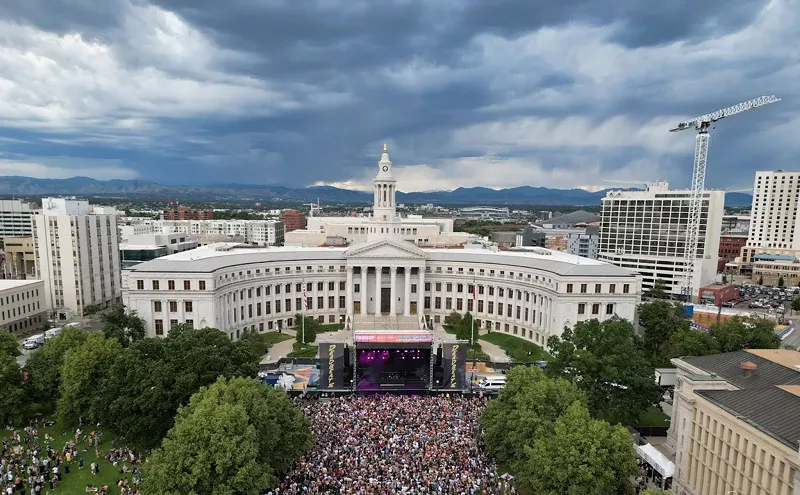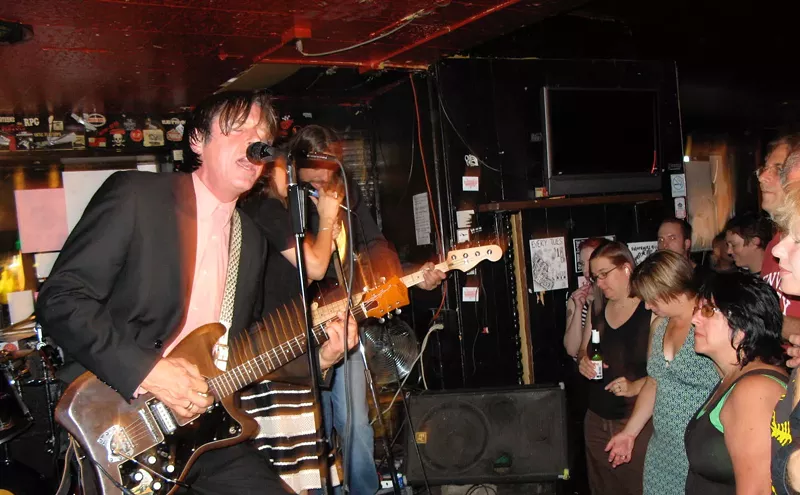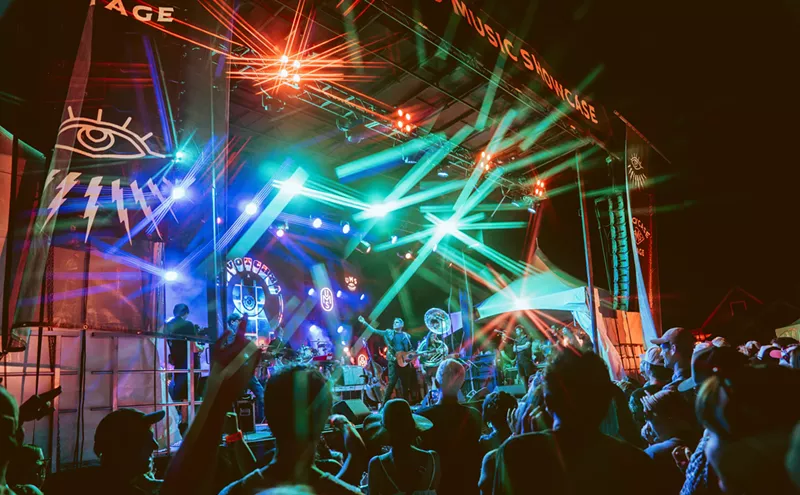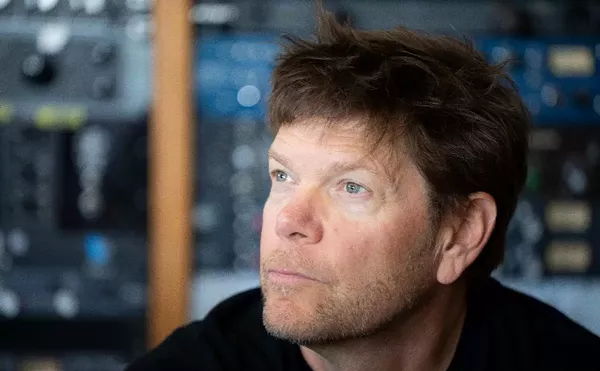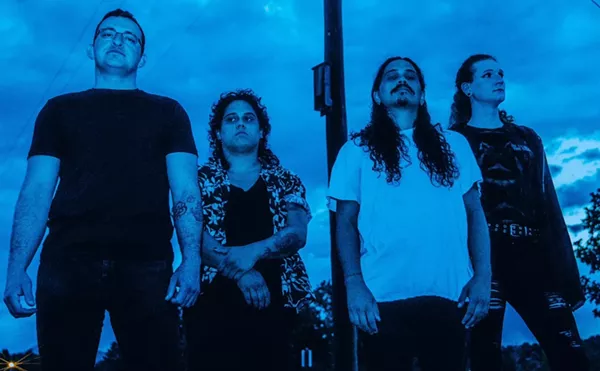My own history is bound up with Tom Petty; over the course of my life, I've seen the Heartbreakers in concert probably fifteen times. (Granted, I was so young at a few of those shows that I fell asleep in my seat before they got to “American Girl,” and this was before the age of Baby Beats by Dre.) It's taken me more than two weeks to finish writing an account of the show, but, hey, it took Petty 32 years to resurrect Mudcrutch.
Even before the band appeared on stage, the crowd seemed keenly aware of the fleeting nature of the show. Though it was advertised only as a Mudcrutch concert, tickets sold out – at more than $100 a pop – before you could say, “What crutch?” There was an edginess in the pit that night, the audience comprising middle-aged folks in flashy shirts who had paid to be there and were determined to make the most of it, sometimes by drinking as many $7 craft beers as possible.
I get it. This was the smallest club we would ever see Petty play; this was the closest we would ever be to the American music icon. YOLO — or whatever the parents are saying these days. I turned thirty a few days after the show at the Ogden, and that milestone was on my mind as I squeezed into the nonexistent photo pit, braced myself between the guardrail and stage – and suddenly came nose-to-boot with
[Look, he's looking at me! He's delighted to see me! More photos below.]
Petty went straight to his usual position at front and center and kicked the show off with “Shady Grove,” the band's chiming, filled-out take on the traditional Appalachian song. Next came “Orphan of the Storm,” also from the band's 2008 self-titled release, which may be the quintessential Mudcrutch song: Petty's blueprint, yet more country than the Heartbreakers, pairing easy harmonies with conscientious/self-conscious everyman lyrics steeped in the southern landscape. That song even has a dash of serious Petty-melody magic: the moment where the chorus soars and shifts, I ain't the ki-ind who gives up/But I'm so, tired, of rain.
Still, this show was not all about Petty – or, at least, there was significant effort for it not to be. Mudcrutch's dynamics are notably different than those of the Heartbreakers. Petty may still be in charge, but he downplays the rock-star role, and was less talkative, expansive or show-offy than I've seen him. (Maybe it's partially because he was playing bass, which hasn't been his role since Mudcrutch's first incarnation.) Others took turns on lead vocals: Benmont Tench on “This Is a Good Street” and (the frankly terrifying) “Welcome to Hell”; drummer Randall Marsh on “Beautiful World"; and guitarist Tom Leadon on “Other Side of the Mountain.” Many Mudcrutch songs aren't even Petty compositions or co-writes; many are covers, a nod to the group's beginnings as a top-notch bar band. The covers are also all-out odes to the musicians' influences, especially on their blazing version of the Byrds' “Lover of the Bayou,” which the men have no doubt adored since they were teenagers.
And like any group of people who've known each other well since they were teenagers, they seemed to display the obscure tensions of intimacy on stage. While Tench and Mike Campbell, Petty's right hand and one of the best rock guitarists ever, stood to the left, Leadon and touring member, guitarist/banjoist and Laurel Canyon veteran Herb Pedersen stood to the right, and Marsh perched at the back. The Heartbreakers are easy to spot: Petty, Tench and Campbell have been rocking arenas with ease for forty years, and that familiarity shows. The other original members played in various bands post-Mudcrutch, but settled into quieter lives by comparison: Leadon taught guitar in Nashville; Marsh lived in Ojai and, according to Tench, would occasionally drunk-dial him late at night and tell him to go to hell.
Maybe I'm projecting, but from his side of the stage, Campbell seemed to watched Leadon's guitar-playing like an older brother. He often kept eyes trained on the guitarist, whether just to see how he was doing or raising a brow and nodding a cue. When Leadon said something about the Denver crowds “always” being great, Petty snarked on mic, “He's only been here once.” It's true that Leadon and Marsh aren't laid-back players; there's a nervousness to their performances – but there's also excitement and joy. They're not over it; they're not playing it cool.
Neither were the fans, who, as the long set unfolded, were starting to drop. Several folks were picked up and led, glossy-eyed, out of the pit. I get it: It's overwhelming to be that close to a musician of the American canon, awash in the flood of heady memory the music brings on, with all its implications – how we got all the way from where we started to here, still connected to this music, or, rather, this musician. Because it was the musicians themselves who exerted the power at the Ogden – not the Mudcrutch catalogue. It was strange to finally be that close, to basically have climbed inside Petty's nostril – and to not hear a single Heartbreakers song, but instead to hear Petty playing his desk-drawer material, what could be considered juvenilia.
I mean, it's cool: Lord Byron did it. Jane Austen did it. (Everyone passing out in public was trotting out their juvenilia.) But as fans, it became clear that the emotion generated at this show was not our memories rocking against us like Gulf waves; it was not our past — it was the band's. The opening line of “Trailer,” the opening track of new album 2, is I graduated high school over wistful harmonicas. When the band closed with a seemingly earnest encore of Jerry Lee Lewis's “High School Confidential,” I actually cringed. In that moment, the whole project felt like the toothless “dad rock” I always protested Petty wasn't.
Petty (and Campbell, for that matter) has always struck me as a forward-thinker, leaning into the next bend in the interstate, really flooring it on the straightaway. So why pause, ever, why look back? He possesses a clear sense of himself, which has allowed him to continue, keep a band (mostly) together, keep touring, keep making excellent and relevant records, experimenting while maintaining his core, his signature. And these Mudcrutch records seem to reinforce that idea: Petty has known who he was and what sounds he wanted to make since the start.
At one point, Petty introduced a number as “probably the fourth song I ever wrote.” That takes balls and luxury, to bust out, at 65, a song you wrote before you knew shit about shit, but that's what he did. Is that depressing or fortifying, to know that our deep concerns and our kernels of genius have been there since the beginning, that we haven't outgrown anything? That we're exponentially better than we once were, and yet we're still hammering out, bit by bit, the work we started as teenagers?
The song, Petty's fourth ever, was called “Save Your Water,” and it was damn good.
I think.
I mean, I think it's damn good because it sounds like Tom Petty ripping off the Byrds, which is, I know, how he began weaving his singular sound, how he became the Tom Petty with the band that wrote all those songs that mean something to us.
It's the songs, those magical, practical things – by the Heartbreakers, Mudcrutch, or any band we love – that remind us who we are and, more important, push that "us" forward, sometimes moving quickly and sometimes so slowly that we seem to be sinking back into the swamp whence we came. But it's those chiming, complicated, straightforward American songs that make up my thirty years, those increments of three-minutes-thirty-seconds that make me better all the time. It's an obvious realization, but I guess it took staring into my artistic hero's silver-capped back teeth to remind me: Mudcrutch isn't about us, and that's totally fine. Our devotion to Petty's music isn't even ultimately about him, no matter how close we get.
[Even this close.]


